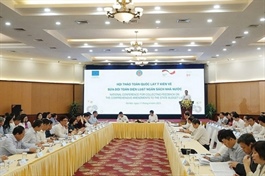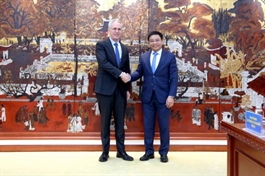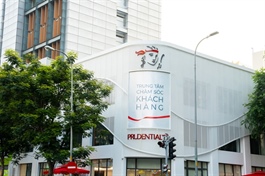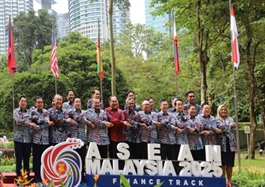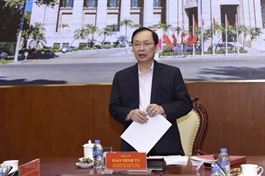Streamlined legal framework, infrastructure, special policies need for int'l financial centres
Streamlined legal framework, infrastructure, special policies need for int'l financial centres
The competition is increasingly fierce for the financial centres in Việt Nam, as they have to compete against those in other countries that have already have strong foundations and attractive investment policies.
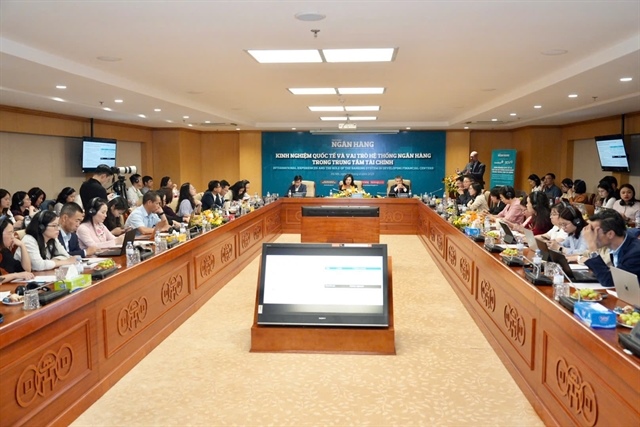
View of the conference. Photo thoibaonganhang.vn |
The Government needs to streamline legal frameworks and infrastructure, as well as offer special incentive policies, to attract investment for international financial centres in Việt Nam.
That was the view of experts at a conference on international experiences and the role of the banking system in developing such centres, held in Hà Nội on Wednesday.
The Deputy Head of the Institute of Strategy and Economic-Financial Policy’s Financial Market Development Department under the Ministry of Finance Lưu Ánh Nguyệt, said that the role of such centres is to connect the global financial market, attract international financial institutions and investment capital flows, create institutional breakthroughs and enhance national competitiveness.
“Favourable factors for building an international financial centre in Việt Nam are its strategic geographical location and deep economic integration," Nguyệt said. "In addition, Việt Nam is also actively improving its institutions, legal system and investment environment and stable macroeconomics. HCM City, which has been on the Global Financial Centres Index (GFCI) assessment list since 2022, also has modern financial market institutions and a dynamic economy.”
However, Nguyệt noted, there are also certain challenges. For example, in terms of infrastructure and institutions, though the country’s socio-economic infrastructure has made positive contributions, it still lacks synchronisation, with an overloaded traffic and an imbalance between types of transportation.
In addition, Nguyệt said Việt Nam’s legal framework has not met international standards, and there is a lack of regulation on cross-border transactions and investor protection. Việt Nam also has not fully liberalised finance and has limitations in technology and cybersecurity.
The competition is increasingly fierce for the financial centres in Việt Nam, as they have to compete against those in other countries that have already have strong foundations and attractive investment policies.
According to Nguyệt, given the above reality, HCM City is suitable for a semi-classical model that links trade, technology, capital markets and financial services. Meanwhile, Đà Nẵng is suitable for a new generation model that integrates free trade zones, green financial services, risk management and foreign exchange.
Nguyệt proposes that the first thing to do when wanting to build an international financial centre is to perfect flexible and modern institutions. Specifically, the Government should build a transparent legal framework in line with international practices and allow for testing of new models such as fintech and digital platforms.
In addition it is necessary to apply the sandbox model like Singapore, with a fast licensing process and good investor protection. At the same time, it needs to strengthen risk monitoring according to international standards to ensure market stability and transparency.
“Second is developing financial and technological infrastructure, including building a modern and globally connected payment system, developing a digital financial zone, supporting start-ups and fintechs to test new services and applying AI, blockchain and big data in transactions, data management and financial security,” Nguyệt said.
Third is tax policy, she said, noting the Government should exempt or reduce corporate income tax and personal income tax for organisations and individuals operating in the international financial centres.
It is possible to learn from the experience of some countries such as Turkey, which has exempted corporate income tax, banking transaction tax and insurance for businesses in the international financial centres. At the same time, outstanding incentives for foreign banks to move their headquarters and branches to Việt Nam should be proposed.
Finally, in addition to simplifying administrative procedures, and minimising registration and licensing procedures for foreign financial institutions, it is necessary to develop high-quality employees and attract international experts in finance, banking, fintech, technology and data analysis, Nguyệt said.
Sharing the same view, Trương Thị Thu Ba, Deputy Director of the Bank for Investment and Development of Vietnam’s Financial Institutions Department, said that to build international financial centres, it is necessary to have stable, transparent and internationally compatible institutions. They also need a modern physical and technological infrastructure, high-quality human resources and integrated and modern financial services.
Ba believed the establishment of financial financial centres in the country will be an opportunity for Vietnamese banks to attract international capital flows, access low-cost capital sources, expand the market and upgrade the financial services ecosystem. It will also be a chance to standardise according to international practices, enhance credibility, increase capital raising capacity, accelerate digital transformation and shape the platform banking model.
- 06:31 17/04/2025




